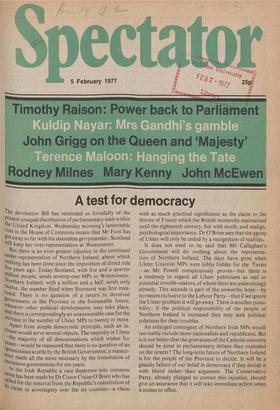A test for democracy
The devolution Bill has reminded us forcefully of the Present unequal distribution of parliamentary seats within the United Kingdom. Wednesday morning's lamentable vote in the House of Commons means that Mr Foot has got away so far with his shameless gerrymander : Scotland will keep her over-representation at Westminster. But there is an even greater injustice in the continued under-representation of Northern Ireland, about which ,hothing has been done since the imposition of direct rule nv.e years ago. Today Scotland, with five and a quarter 111.,,tillon people, sends seventy-one MPs to Westminster; ;.Northern Ireland, with a million and a half, sends only 'welve, the number fixed when Stormont was first instituted. There is no question of a return to devolved government in the Province in the foreseeable future, Whatever other political developments may take place, flc:1 there is correspondingly an unanswerable case for the Increase in 'the number of Ulster MPs to twenty or more. c Apart from simple democratic principle, such an int-ease would serve several objects. The majority in Ulster the majority of all denominations which wishes for reace—would be reassured that there is no question of an :norninious scuttle by the British Government; a reassur:lee made all the more necessary by the irresolution of 'ueeessive governments for ten years. n In the Irish Republic a rare departure into common 4eeuse has been made by Dr Conor Cruise O'Brien who has iPed for the removal from the Republic's constitution of S Claim to sovereignty over the six counties—a claim with as much practical significance as the claim to the throne of France which the British monarchy maintained until the eighteenth century, but with much, and malign, psychological importance. Dr O'Brien sees that the agony of Ulster will only be ended by a recognition of realities.
It does not need to be said that Mr Callaghan's Government will do nothing about the representation of Northern Ireland. The days have gone when Ulster Unionist MPs were lobby fodder for the Tories —as Mr Powell conspicuously proves—but there is a tendency to regard all Ulster politicians as real or potential trouble-makers, of whom there are quite enough already. This attitude is part of the unworthy hope—by no means exclusive to the Labour Party--that if we ignore the Ulster problem it will go away. There is another possibility: if the political responsibility of the people of Northern Ireland is increased they may seek political solutions for their troubles.
An enlarged contingent of Northern Irish MPs would inevitably include more nationalists and republicans. But is it not better that the grievances of the Catholic minority should be aired in parliamentary debate than exploded on the streets ? The long-term future of Northern Ireland is for the people of the Province to decide. It will be a ghastly failure of our belief in democracy if they decide it with blood rather than argument. The Conservative Party, already pledged to correct this injustice, should give an assurance that it will take immediate action when it comes to office.


































